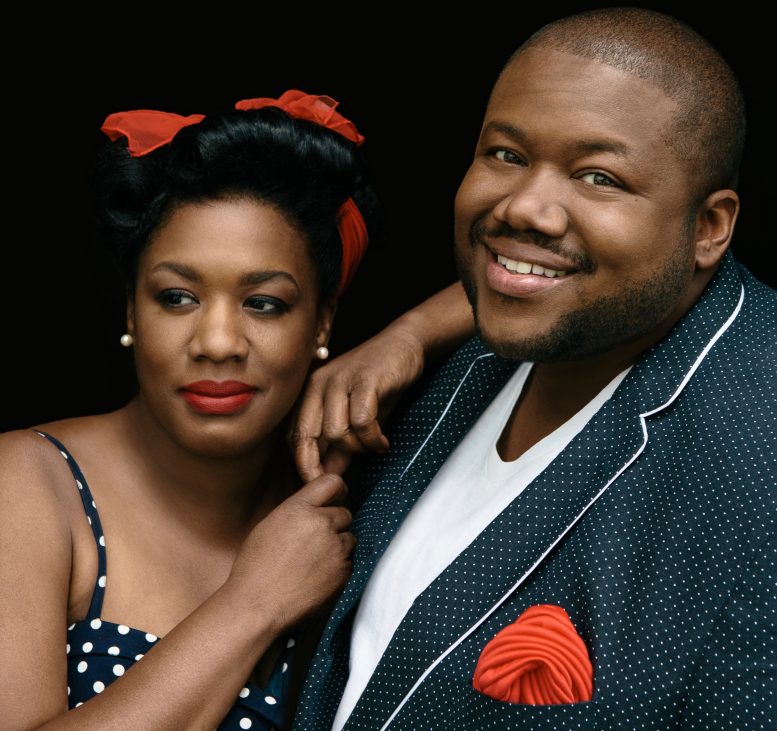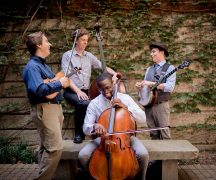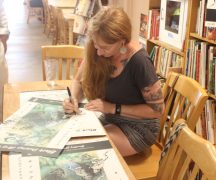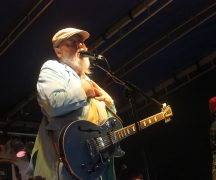By DAVID DUPONT
BG Independent News
When Michael Trotter, Jr. was a child growing up in Cleveland, he heard the Winans Brothers’ gospel anthem “Everything You Touch Is a Song.”
He had not written any songs himself. He had no formal musical training, though he’d been singing in his church’s adult choir since he was 5, and at 8 he was teaching the harmony parts.
“When I was a young boy I fell in love with that song and I believed it,” Trotter said in a recent telephone interview.
The songs didn’t start flowing until he was in his 20s and in the Army stationed in Iraq. Moved by the death of one of the officers who had treated him as an equal, he wrote his first song using a piano with Saddam Hussein’s initials emblazoned on it.
More songs about his fallen “battle buddies” followed, and his music blossomed further when he was back stateside. There he met Tanya Blount, a professional singer who’d had a feature number in the movie “Sister Act 2.”
He fell in love, and after a time she did as well.
That led to marriage and the musical partnership The War and Treaty.
“I have a whole lot more material write about than just death. Now I have life and love to write about,” Trotter said.
The War and Treaty will close the Friday night show on Sept. 6 on the Main Stage of the Black Swamp Arts Festival in Bowling Green.
Trotter admits that he was intimidated when he first met Blount. Her piercing black eyes stopped him. He was confused, not wanting to misread her.
He had already composed their story in his head — they were already at the altar on their way to have a half-dozen kids.
When he got passed that initial hurdle, he found her welcoming. “Everything about her is attractive.”
Finding her was another instance of Trotter “beating the odds.” That, he said, is what the American Dream is about — “beating the odds.”
And the odds for him given his background and own youthful errors were long.
He’d known hard times until just a couple years ago.
His father taught electronics in Cleveland but “he struggled with demon of drugs and alcohol. My family struggled financially because of that habit.”
He recalls seeing his father staring at a stack of bills, his head in his hands.
“I also saw a man who would do anything to take care of his family,” he said. Trotter recalls one day driving with his father a blood collection center and watching him steel himself before he went in to sell his blood for enough money to feed his family for a day.
Trotter thought to himself that he never wanted to get that low. “I also wanted to do my best to make my dad proud.”
Trotter saw his father “go from drugs and alcohol, ostracized from the church and losing his home to overcoming drugs and repairing his marriage.”
He was able to buy a brand new home in Maryland and retire so he can play with his grandchildren, and appreciate his son’s success.
“That’s the story of Michael Trotter, Sr.”
Trotter’s own journey had detours of its own. He dropped out of school in ninth grade. He became a father at 17.
He was working at Babies R Us, and that didn’t pay enough to buy diapers — they didn’t even give an employee discount.
“I needed to make a quick decision,” he said. “Our country, they have an answer for you, and it’s called the military.”
He had a baby and another on the way. “I joined the Army strictly on those terms.” He didn’t even know there was a war going on. “Being a kid from the block, being kid from the hood, you don’t have time to pay attention to that. You’re living the news. I wasn’t patriotic. I didn’t care.”
What he cared about was looking in his infant daughter’s eyes and realizing that “I had an opportunity to change her life, to make sure she didn’t have to struggle.”
And before he was shipped off to Iraq his second daughter was born in Washington DC, in “the president’s hospital.”
She came into the world in different circumstances than he did. “I realized I was beating the odds.”
In Iraq he found brotherhood. “That’s the tougher part of that situation,” he said. “You get close with battle buddies then you look up and they’re gone. You might be the one’s that’s gone. The void’s there.”
When he found music, he found his voice and his purpose. “What I was good at could bring healing to a hurtful situation. The soldiers needed me, and I needed them.”
He started playing the piano at the encouragement of his commanding officers “because I was visibly the most fearful soldier. I was afraid. I had nothing but fear of being in the war. I was going to get somebody killed if they hadn’t given me something to calm me down. Some need drugs. I needed music to bring me down a notch.”
Trotter sat at that piano thinking about how this piano had been owned by Saddam Hussein. “This piano’s been touched by a tormented mind, tyrannical hands. If someone like that can sit here and find moments of peace than surely I can,” he said. “That opened me up to want to learn that instrument. … This piano is a weapon of peace.”
He composed songs for the fallen, and then back in Washington, he wrote songs about his life. “My writing led to the beautiful Tanya Blount.”
So he wrote about the love that became part of his life. “Tanya is created in love. She has nothing but love, and love breeds understanding, and understanding breeds compassion. Everything my wife is, is what I need.”
The music reflects an authentic expression of their relationship. The interplay on stage is not fake. The band sometimes laughs, Trotter said, because they know the audience thinks the interaction is part of the act. “The band knows the truth — the same banter we have on stage is the same banter we have off. Being married you can’t fake it. I can’t get up on stage and talk about something purely, frankly, if I’m not living it at home. Same for Tanya. We’re honest all the way around.”
They don’t want to be “cute” or “nice” Trotter said.
“We’re coming to bare our souls. We want change. We want unification. We want inclusion. We want our country and world to understand we are stronger and better together. That’s the driving force behind what we’re doing.”
That mission is embedded in the music of The War and Treaty.
They are the rare African-Americans in the Americana genre. Their sound is rooted gospel, at once contemporary and primal, and is shot through with echoes of rhythm ’n’ blues, old-time mountain music, and country.
Trotter feels Americana is the right fit for the duo. “I believe Americana is a safe haven for all the styles that are being threatened with extinction — classic rhythm ’n’ blues, classic gospel, classic country, classic bluegrass, classic blues. That’s where we belong.” As African-Americans, he said, they can be proud to be ambassadors for Americana. “We started blues, rock, and jazz. This is us. We should be proud to uphold those standards and traditions.”
Trotter writes constantly. He composes in his head — the lyrics, the melody, the chords. He figures as The War and Treaty starts preparing for their follow up to their current recording “Healing Tide,” he has about 150 songs to consider.
Those songs get rehearsed on his wife’s terms. She reminds him of everything she has on her plate while he’s composing. She’s firm about what she’ll sing.
Writing for her, he said, is easy. “If I was a woman I’d like to sound like Tanya. That’s the missing piece of my voice, and I’m the missing piece of her voice.”
He’s careful not to write outside her range, though he admits he will challenge her at times. “She’ll say ‘I can’t do that.’ Then she does it and it surprises her.”
Sometimes she’ll offer advice about his singing, and he’ll get his back up. After all, he’s the one who wrote the music. “After I get over my ego, I try it her way and she’s right.”
Trotter said he’s shocked by their success.
Closing out the Montreal Jazz Festival, coming on after artists such as George Benson and Dianne Reeves, to an audience of 40,000 waiting for them, is humbling.
“All I know is Tanya and I are eternally grateful for the opportunity to just touch somebody,” Trotter said. “Our love is music. Every time we breathe is an opportunity to capture the melody of life.’’





